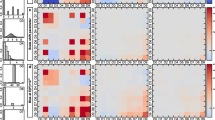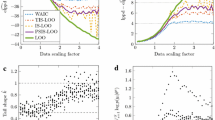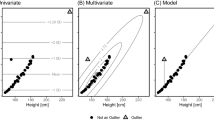Abstract
In this work, we introduce the random weighting method to the nonlinear regression model and study the asymptotic properties for the randomly weighted least squares estimator with dependent errors. The results reveal that this new estimator is consistent. Moreover, some simulations are also carried out to show the performance of the proposed estimator.
Similar content being viewed by others
References
Barvinok A, Samorodnitsky A (2007) Random weighting, asymptotic counting, and inverse is operimetry. Israel J Math 158(1):159–191
Block HW, Savits TH, Shaked M (1982) Some concepts of negative dependence. Ann Prob 10(3):765–772
Bozorgnia A, Patterson RF, Taylor RL (1996) Limit theorems for dependent random variables. In: Proceedings of the first world congress of nonlinear analysts 92 (II), Walter de Grutyer, Berlin, 1639–1650
Chen PY, Bai P, Sung SH (2014) The von Bahr-Esseen moment inequality for pairwise independent random variables and applications. J Math Anal Appl 419(2):1290–1302
Chen YQ, Chen AY, Ng KW (2010) The strong law of large numbers for extended negatively dependent random variables. J Appl Prob 47:908–922
Fang YX, Zhao LC (2006) Approximation to the distribution of LAD estimators for censored regression by random weighting method. J Stat Plan Inference 136(4):1302–1316
Gao SS, Zhang JM, Zhou T (2003) Law of large numbers for sample mean of random weighting estimate. Inf Sci 155(1–2):151–156
Gao SS, Zhong YM (2010) Random weighting estimation of kernel density. J Stat Plan Inference 140(9):2403–2407
Hu SH (2002) The rate of convergence for the least squares estimator in nonlinear regression model with dependent errors. Sci China Ser A 45(2):137–146
Hu SH (2004) Consistency for the least squares estimator in nonlinear regression model. Stat Prob Lett 67(2):183–192
Ivanov AV (1976) An asymptotic expansion for the distribution of the least squares estimator of the nonlinear regression parameter. Theory Prob Appl 21(3):557–570
Jennrich RI (1969) Asymptotic properties of nonlinear least squares estimators. Ann Math Stat 40(2):633–643
Joag-Dev K, Proschan F (1983) Negative association of random variables with applications. Ann Stat 11:286–295
Lita da Silva J (2015) Almost sure convergence for weighted sums of extended negatively dependent random variables. Acta Math Hungarica 146(1):56–70
Liu L (2009) Precise large deviations for dependent random variables with heavy tails. Stat Prob Lett 79:1290–1298
Liu L (2010) Necessary and sufficient conditions for moderate deviations of dependent random variables with heavy tails. Sci China Ser Math 53(6):1421–1434
Lehmann E (1966) Some concepts of dependence. Ann Math Stat 37:1137–1153
Malinvaud E (1970) The consistency of nonlinear regression. Ann Math Stat 41(3):956–969
Miao Y, Tang YY (2021) Large deviation inequalities of LS estimator in nonlinear regression models. Stat Prob Lett, 168, Article ID 108930, https://doi.org/10.1016/j.spl.2020.108930
Ng KW, Tian GL, Tang ML (2011) Dirichlet and related distributions: theory, methods and applications, vol 888. John Wiley & Sons, London (Chapter 1, 2)
Narayanan A (1990) Computer generation of Dirichlet random vectors. J Stat Comput Simul 36(1):19–30
Prakasa Rao BLS (1984) The rate of convergence of the least squares estimator in a non-linear regression model with dependent errors. J Multivariate Anal 14(3):315–322
Rubin DB (1981) The Bayesian bootstrap. Ann Stat 9:130–134
Shen AT (2011) Probability inequalities for END sequence and their applications. J Inequal Appl 2011:98, 12
Sieders A, Dzhaparidze K (1987) A large deviation result for parameter estimators and its application to nonlinear regression analysis. The Annals of Statistics 15(3):1031–1049
Staniewski P (1984) The Bootstrap in nonlinear regression. In: Rasch D, Tiku ML (eds) Robustness of statistical methods and nonparametric statistics. Theory and decision library (series b: mathematical and statistical methods), vol 1. Springer, Dordrecht, pp 139–142
Wang SJ, Wang XJ (2013) Precise large deviations for random sums of END real-valued random variables with consistent variation. J Math Anal Appl 402:660–667
Wang XJ, Hu SH, Shen AT, Yang WZ (2011) An exponential inequality for a NOD sequence and a strong law of large numbers. Appl Math Lett 24:219–223
Wang XJ, Li XQ, Hu SH, Wang XH (2014) On complete convergence for an extended negatively dependent sequence. Commun Stat Theory Methods 43(14):2923–2937
Wang XJ, Zheng LL, Xu C, Hu SH (2015) Complete consistency for the estimator of nonparametric regression models based on extended negatively dependent errors. Statistics 49(2):396–407
Wu CF (1981) Asymptotic theory of nonlinear least squares estimation. Ann Stat 9(3):501–513
Wu Y, Wang XJ, Hu T-C, Volodin A (2019) Complete \(f\)-moment convergence for extended negatively dependent random variables. RACSAM 113:333–351
Xue LG, Zhu LX (2005) \(L_1\)-norm estimation and random weighting method in a semiparametric model. Acta Math Appl Sin 21(2):295–302
Yang WZ, Hu SH (2014) Large deviation for a least squares estimator in a nonlinear regression model. Stat Prob Lett 91:135–144
Yang WZ, Xu HY, Chen L, Hu SH (2018) Complete consistency of estimators for regression models based on extended negatively dependent errors. Stat Pap 59(2):449–465
Yang WZ, Zhao ZR, Wang XH, Hu SH (2017) The large deviation results for the nonlinear regression model with dependent errors. TEST 26(2):261–283
Zheng ZG (1987) Random weighting method. Acta Math Appl Sin 10(2):247–253
Acknowledgements
The authors are most grateful to the Editor and anonymous referee for carefully reading the manuscript and valuable suggestions which helped in improving an earlier version of this paper. Supported by the National Natural Science Foundation of China (12201004, 12201079, 12201600), the National Social Science Foundation of China (22BTJ059), and the Natural Science Foundation of Anhui Province (2108085MA06).
Author information
Authors and Affiliations
Corresponding author
Ethics declarations
Conflict of interests
There is no conflict of interest.
Additional information
Publisher's Note
Springer Nature remains neutral with regard to jurisdictional claims in published maps and institutional affiliations.
Appendix
Appendix
Lemma A.1
Let \((W_{1},\cdots ,W_{n})\sim Dir(\alpha _{1},\cdots ,\alpha _{n})\) for each \(n\ge 1\) and \(\{\xi _{n},n\ge 1\}\) is a sequence of nonnegative END random variables. Then \(\{W_{n}\xi _{n},n\ge 1\}\) is still a sequence of END random variables.
Proof
It follows from Example 5.4 of Block et al. (1982) that \(\{W_{n},n\ge 1\}\) is a sequence of nonnegative NOD random variables, which is independent of \(\{\xi _{n},n\ge 1\}\). Hence, for any real numbers \(z_1,\cdots ,z_n\), we have by Definition 1.2 and the properties of NOD random variables (see in Bozorgnia et al. (1996) or Lemmas 1.1 and 1.2 of Wang et al. (2011) for example) that
Similarly, we also have that
Therefore, \(\{W_{n}\xi _{n},n\ge 1\}\) is still a sequence of END random variables by Definition 1.2 again. \(\square \)
Lemma A.2
Let \(\{a_{ni},1\le i\le n,n\ge 1\}\) be an array of real numbers and \(\{X_{n},n\ge 1\}\) be a sequence of END random variables with \(EX_{n}=0\) and \(E|X_{n}|^{p}<\infty \) for each \(n\ge 1\) and some \(p>1\). Then there exist positive constants \(C_{p}\) and \(C_{p}'\) depending only on p such that
Proof
Noting that \(a_{ni}=a_{ni}^{+}-a_{ni}^{-}\) for each \(1\le i\le n\), \(n\ge 1\), the Rosenthal inequality above is a direct consequence of Corollary 3.2 in Shen (2011) by using \(C_{r}\)-inequality. The second inequality, i.e., Marcinkiewicz-Zygmund inequality can be obtained by the first one and the method used in the proof of Theorem 2.1 in Chen et al. (2014). The details are omitted. \(\square \)
Lemma A.3
Let \((Y_{1},\cdots ,Y_{n})\sim Dir(\alpha _{1},\cdots ,\alpha _{n})\) and \(\alpha _0=\sum _{i=1}^{n}\alpha _{i}\). Then for any \(p>0\) and each \(1\le i\le n\),
Proof
Without loss of generality, we only need to show \(EY_{1}^{p}=\frac{\Gamma (\alpha _{0})\Gamma (\alpha _{1}+p)}{\Gamma (\alpha _{0}+p)\Gamma (\alpha _{1})}\). By Definition 1.1 and some standard calculation, we have that
where the second equality above follows by letting \(\eta _{n-1}=y_{n-1}/\left( 1-\sum _{i=1}^{n-2}y_{i}\right) \). \(\square \)
Lemma A.4
(cf. Hu 2004) Let \((\Omega ,\mathscr {F},P)\) be a probability space, \([T_{1},T_{2}]\) be a closed interval on the real line. Assume that \(V(\theta )=V(\omega ,\theta )\) \((\theta \in [T_{1},T_{2}],\omega \in \Omega )\) is a stochastic process such that \(V(\omega ,\theta )\) is continuous for all \(\omega \in \Omega \). If there exist numbers \(\alpha >0\), \(r>0\) and \(C=C(T_{1},T_{2})<\infty \) such that
then for any \(\varepsilon >0\), \(a>0\), \(\theta _{0},\theta _{0}+\varepsilon \in [T_{1},T_{2}]\), and \(\gamma \in (2,2+\alpha )\), it has
Rights and permissions
Springer Nature or its licensor (e.g. a society or other partner) holds exclusive rights to this article under a publishing agreement with the author(s) or other rightsholder(s); author self-archiving of the accepted manuscript version of this article is solely governed by the terms of such publishing agreement and applicable law.
About this article
Cite this article
Wu, Y., Yu, W. & Wang, X. Large deviations for randomly weighted least squares estimator in a nonlinear regression model. Metrika (2023). https://doi.org/10.1007/s00184-023-00926-0
Received:
Accepted:
Published:
DOI: https://doi.org/10.1007/s00184-023-00926-0




